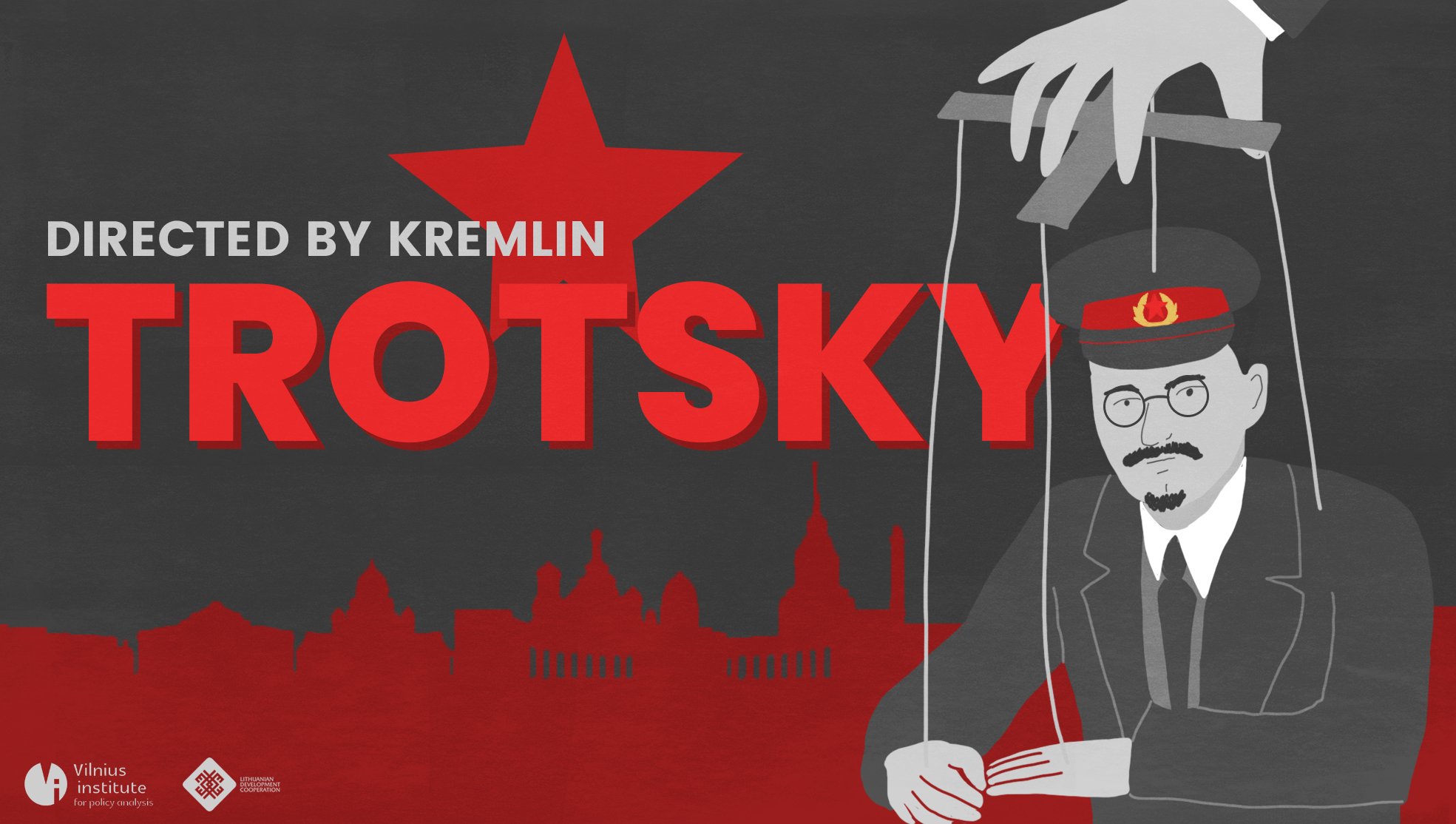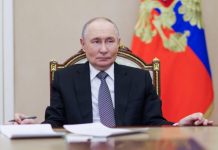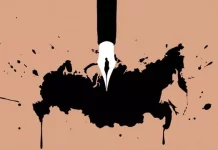
By Donatas Puslys, Vilnius Institute for Policy Analysis, for StopFake
“We will come back and destroy you all“, – Leon Trotsky said after the failed 1905 revolution. The governor of the Saratov region and the future Tsarist Russian Prime Minister, Pyotr Stolypin, replied: “You don’t understand one thing. Any religion built on blood is a monster that will sooner or later devour its children. Do you think you will feed us to this monster, and everything will end? No, think about it in your free time.”
Revolutionary fanatic turned into a rock star
This is a scene from the biographical series Trotsky commissioned by the First Channel, directed by Aleksandr Kott and Konstantin Statsky. Now the series is available on Netflix.
“Trotsky is a real rock star and he was a real rock star for all his life, not only during the October Revolution”, – said the producer of the series Konstantin Ernst. According to him, Trotsky is a character that the younger generation can relate to. Therefore, here the question arises – what is the key message that the creators of the series want to deliver to the new generation?
This question is very important, given the fact that the Kremlin avoided mentioning the 100th anniversary of the October Revolution for one very simple reason – although Vladimir Putin describes the collapse of the Soviet Union as the greatest geopolitical disaster of the twentieth century, the fact of the revolution itself is unacceptable to him. “From the Kremlin perspective, the Bolshevik Revolution was good because it created the Soviet Union, which led to the current system. But the bad thing about it is that it destroyed the old regime, which is the greatest sin for those who treasure the power of the state. This leads to confusion and results in the fact that it is convenient to simply ignore the October Revolution”, – Andrei Zorin, a historian at Oxford University said to The New Yorker.
Trotsky wrote the music and Lenin simply played it?
So why did the state television decide to make the series about Trotsky and the revolution if usually the Kremlin avoids this topic? First of all, let’s pay attention to the initial quote warning that any revolution is evil in itself. Dissatisfaction with the situation and the desire for change can be understood and sometimes inevitable, but trying to acquire change through the revolution is reprehensible, dangerous, and ultimately backfires on revolutionaries. This message makes it obvious that this is not just an analysis of the past, but also a warning for the present – especially to those opponents who are talking about changing the regime. The series depicts the turmoil of 1917, and obviously implies what would happen to Russia if Putin had fallen. The Kremlin repeatedly repeats that Putin’s regime is a guarantee of stability, pulling the country out of the chaos of the 1990s, to which Russia, torn by different interest groups, would once again sink without him.
We could say that Trotsky wrote the music that Lenin sang. Trotsky created the revolution, and Lenin only led it,” – stated one the series‘ directors Kott. According to him, Trotsky was the main driving force behind the revolution, but could not become its official face because of his Jewish origin, and thus Lenin was chosen. Ernst called Trotsky the executive producer of the revolution. But is everything really the way the series and its authors tell us? “
Seems like anti-Semitism and distortion of facts?
“This is total nonsense. This is not in line with historical facts. I totally disagree with that. It looks like anti-Semitism, like an attempt to uphold the idea that the Jews are responsible for the revolution, not the Russians. It is very strange,” – Gennady Estraikh, a professor at the University of New York, specializing in Russian Jewish studies, told The Times of Israel. Associate professor at Harvard University, Joshua Rubinstein, who has written a book about Trotsky, claims that there is no doubt that the real leader of the revolution was Lenin. Similarly, according to him, it is not true that Trotsky bears responsibility for the execution of the Tsar’s family, which was organized by Lenin and Sverdlov.
The motif of a steamer that runs across Russia is often repeated in the series. This motif embodies how Trotsky is depicted in the series – a fanatic revolutionary moving forward despite any circumstances. However, in the series, this fanatic revolutionary, who came to believe that he knows how to transform the world, is also depicted as a tool in the hands of a businessman Alexander Parvus who works for the Germans.
An interesting detail – A. Parvus, whose real name is Gelfand, is a Jew. What is the narrative here? The Germans, manipulating the revolutionary Jews of Russia, seek to destabilize the Tsarist empire. It is implied that such bloody tragedies could have been avoided if some of the revolutionary leaders had not allowed themselves to be manipulated by the hostile foreign forces. The Kremlin constantly repeats its belief that the opposition forces within the country are tools of foreign forces seeking to destabilize Russia. Such accusations have been repeatedly received by Alexei Navalny, Boris Nemtsov, Garry Kasparov and other oppositionists. In addition, attempts are being made to demonstrate that these opponents are not only manipulated by foreign forces, but they are not the real Russians, just like Trotsky. It is implied that they lack roots and the feeling of the nation’s spirit, and that they are driven forward only by abstract ideas that are far away from reality and thus dangerous.
The Kremlin’s warning to the opposition
Making Trotsky responsible for revolutionary atrocities not only hints to anti-Semitism but also allows to take the heat off Lenin. And Lenin remains a popular figure in Russia. At the end of 2017, a survey conducted by the Levada Center showed that 41 percent of the respondents were in favour of keeping Lenin’s remains in the Red Square‘s mausoleum. The same percentage were in favour of moving the remains elsewhere. Thus, Lenin is a polarizing figure that the Kremlin prefers not to touch. It is much more convenient to use Trotsky for their purposes. His character in the First Channel series serves as a warning that foreigners and non-true Russians that are influenced by them, are responsible for Russia‘s disasters. It is also an attempt to demonstrate where the rebellion against the rulers, instigated by charismatic fanatics, leads. In the series, Trotsky is portrayed as a great orator who is able to bring people together and lead the crowd. However, he leads to the abyss; just like in the painting by Pieter Bruegel, where the blind leads the crowd of the blind to the abyss. Thus, the Trotsky series is not an attempt to tell the history, it is rather a creation of historical mythology according to the wishes of the current regime. It is a story that serves not the search for the truth, but the political goals of the current leaders.
By Donatas Puslys, Vilnius Institute for Policy Analysis, for StopFake




